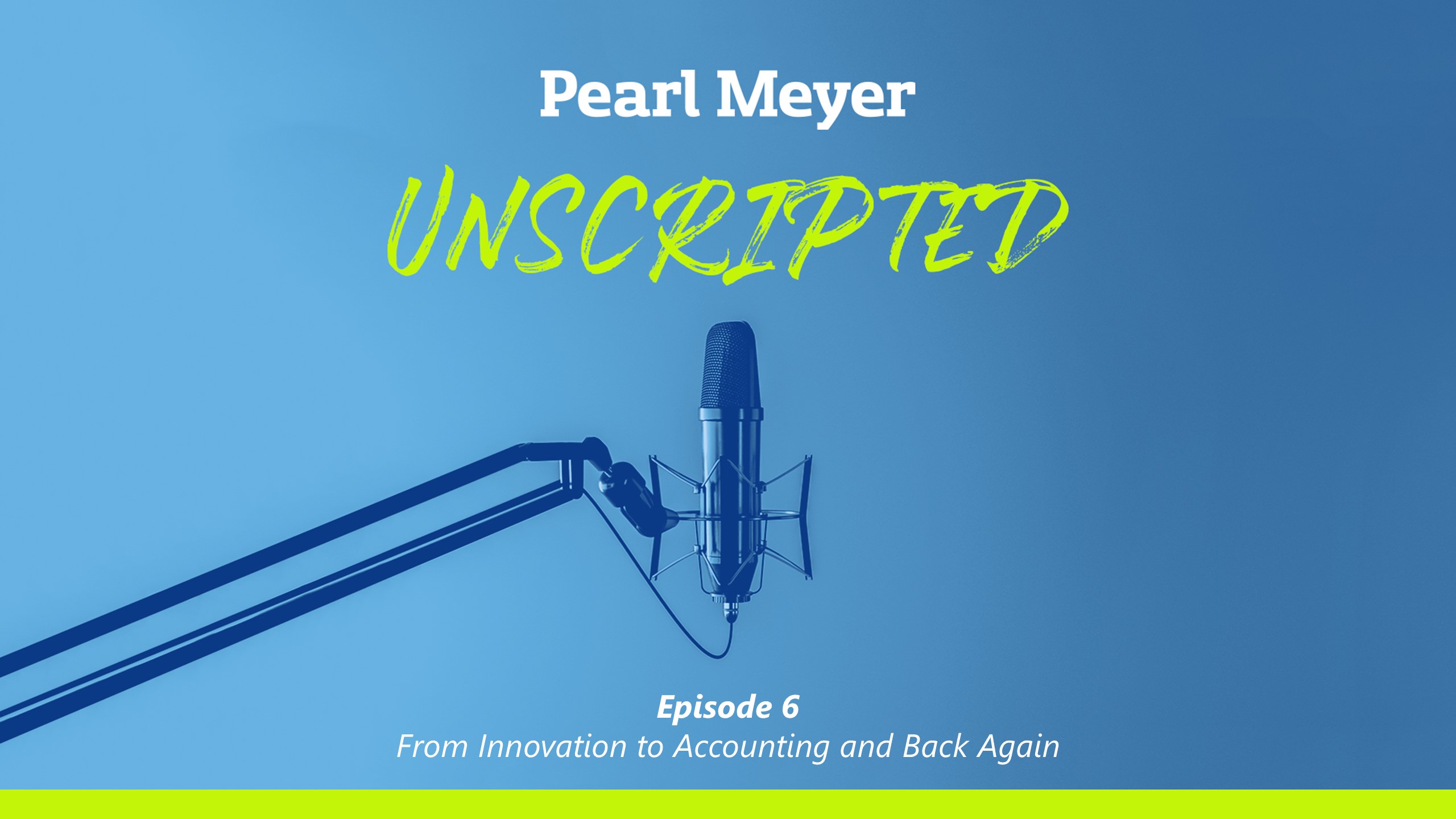
Podcast | Jul 2025 | The Pearl Meyer Unscripted Podcast
From Innovation to Accounting and Back Again
S1 Ep6: Is it possible to identify and incorporate executive incentive plan metrics that spur innovation?
Transcript
Jake: Can an executive incentive plan spur innovation? Hi, I'm Jake George, CMO at Pearl Meyer. And on this episode of Pearl Meyer Unscripted, Mark Rosen and Aalap Shah will explore that very question. Mark is the head of our firm's technical services team and a CPA, while Aalap works with a large client base of life sciences and technology companies, among others. They're experts in executive compensation, accounting and disclosure, and how to incentivize management teams that are on the leading edge of discovery. Let's listen as they weigh these two positions.
Aalap: Hey, Mark, remember last time we were speaking, we had that question about non-financial metrics and applicability to long-term incentives. Do you have time to talk about that today?
Mark: Oh yeah, we had talked about how that applies to short-term incentives, and we were going to talk about long-term, but we didn't have time. So yeah, have you thought any more about that?
Aalap: Yes, and I think this is going to be a bit of a hot button, because I look at the landscape and every time I've talked about this with other clients, it is a minority of a minority practice, I would say, and having non-financial metrics in long term. I think that's just an area that many public companies don't want to touch. But what's interesting, is that private companies do seem to be some more prevalent in that. Do you find the same?
Mark: I do, and it has a lot to do with that trust level between management and the board or ownership if it's a private company. You want certainty as to what you have to do to achieve or to earn the award. And in the short term, you obviously can have more discretion because it's typically paid in cash. In long-term incentives, you've got some accounting issues that can get in the way of utilizing discretion. Private companies often will use cash in their long-term incentives, so it doesn't matter as much, because they're not worried about that accounting issue. I think that it gets down to trust and whether or not you care about what the financial reporting looks like.
Aalap: Yeah, I'm always a big proponent of public companies thinking about this more because the use case on having non-financial metrics in the long-term incentive plan, I see, you know, many, many different instances where we could potentially do that. And so I guess the question is, would you be completely opposed to that if you were on the board.
Mark: For a public company or non-public?
Aalap: For a public company.
Mark: So this is an interesting issue. So let's just talk for a moment about what this accounting issue is that we need to get out of the way.
Aalap: You are our resident accounting expert, so please, educate me, Mark.
Mark: Well, so most people like certainty and certainly the accountants like certainty. Whenever you make an equity grant in order to ensure that you have a grant date so you can begin accruing expense and you know what the expense will be you have to have a mutual understanding of what the terms and conditions are, which basically means I know what I need to do to earn this award. So an example would be if you were to achieve $100 of EBITDA over a three-year period, you will earn the grant. So that's really straightforward and very simple and that's the kind of design that we tend to see. There may be different metrics, but they're known on the date of grant. If we don't know what I have to do to earn the shares that I've been provided with, we don't have a grant date. And what that means is that the expense is going to be dependent on the stock price whenever the grant date occurs. And if I retain discretion as to what the performance needs to be, or even I say, look, it has to be a hundred dollars a EBITDA, but I might change it over time. I don't actually have a grant date until I grant those shares at the end of the three year period. And if the stock price is tripled over that period, which let's hope that it does, but if the stock price is tripled, I'm not actually going to start accruing that expense until I grant the shares at the end of the three year period when everybody knows what needed to be done, that's not certainty for either the participant or the board. And so what we see there is also a, a large expense on the date at the end of the performance period when it's actually granted. So for that reason, we tend not to see equity-based awards that don't have what I would call fixed metrics. And this is old, but I'm old. We used to have this concept of fixed versus variable accounting. It was really easy for people to understand because it was fixed in that the stock price was fixed versus variable in that the stock price could vary over time. Now that's a really old concept and all of our new staff don't learn it because it's just old people like me referring to an old accounting concept. But I think the differentiation we need to make is if it's a cash-based plan. Because a cash-based plan is essentially marked to market at every quarter. And the expense that will incurred for a cash-based plan is whatever the payout is. So it's not unlike an annual plan where the expense that you take is equal to whatever the cash that you pay out at the end of the period. It's just a cash-based long-term incentive. It's just like your annual plan but over a longer period. So that's why private companies don't really worry too much about, at least private companies that are not going to be going public and aren't going to have to later disclose their financial statements. They like to retain that discretion and they can make adjustments as you go through the year. They might adjust the targets each year. And at the end, they pay out an amount of cash and that's what the earnings charge is.
Aalap: Yeah, no, I mean I think you're spot on, right? And I think these are concerns that need to be vetted. But as a young soul, I kind of dislike the idea that private companies may have more ability to be creative regarding compensation and engage their people a bit more than public companies. So where I tend to see, or want to see companies think about these non-financial metrics in their plans, is when you're potentially going through a transformation or if you're launching a new product line, there may not be hard financials that you could put around that, but there should be, and again, I'll defer... I'll make the questions, I'll make the strategy, but I'll defer to the auditors, but there should be a way to hang your hat on definitive metrics so you can make sure that you don't run into this variable accounting issue with the equity grants. But that doesn't mean that you don't have a portion of your long-term program in cash, which then obviously makes it a bit easier. So, I think having that creativity infused in your long-term program, you know, just one, put you on par with some of those private companies that are already doing that. And two, is likely extremely relevant to the business. Because another example I have recently, which I was going to give to this director, was post M&A. A company decided to put, a publicly traded company decided to put synergy metrics in their long-term program and they weren't necessarily cost saving synergies, but they needed to do a lot of organizational transformation to make the M&A worthwhile so it'll be in their long-term program on a temporary basis, but it still will be a non-financial metric.
Mark: And I think this brings us to a very big philosophical point on long-term incentives. We need to do what's right. And what's right is in the best answers of shareholders. And sometimes we get too concerned with what institutional advisors are going to say. We get too concerned with how it's going to be reported in the summary compensation table. So for example, mixing in some cash into the long-term incentive has a lot of benefits...
Aalap: Absolutely.
Mark: ...including reducing the need for an executive to sell shares. So there are lots of good reasons to do the kind of things that you're talking about. And then lastly, you talked about creativity. I can't agree any more that we will often get caught up in our shorts around, what is the accounting treatment and how is it going to be reported? I don't disagree that's really important because anything out of the ordinary is, we're to have to explain it at any time you have to explain something you're already behind. But I think it's important to understand what makes sense for the shareholders, what makes sense for the company. And sometimes those don't fit very neatly into the reporting structures that we have that we typically will see.
Aalap: Yeah, no, you're absolutely right, Mark. I mean, this has been really helpful. I mean, I think just to sum, given that this organization has had 100% financial metrics in both the short-term and long-term plan for a good number of years, my guess is what's going to happen is that they may be open to introducing it either as a modifier or a weighted metric in the annual program. But introducing it in the long-term program, even if I might think that might be the right thing, that's probably a little bit more of an uphill battle. But I am going to remind them that financial metrics and measuring financial metrics don't always breed innovation. And so if this is something that is top of mind, which I know it is for many organizations, having a metric, most likely a non-financial one, that supports innovation is something they really want to consider. But I think that might be a couple of years down the road. I'll let you know how the conversation goes.
Mark: Please do.
Aalap: But yeah, this has been extremely helpful. Thanks, Mark. And I do have a call later this week with another company and I'm sure it seemed like, this is from the CEO not a director, and it seems like the CEO's a little bit hot on the collar about something. So I may be pinging you again if that's okay.
Mark: No, I'm on vacation next week, Aalap.
Aalap: Aw, come on, Mark.
Mark: Okay, for you, for you, for any, just call my mobile.
Aalap: Alright Mark, really appreciate it. Thanks again.
Mark: Good luck. Thank you.
Jake: Thanks for listening to the first season of the Pearl Meyer Unscripted Podcast, available on Spotify, Pearlmeyer.com, or wherever you get your podcasts. We look forward to being back in your feed soon with another season of discussion and debate that can help connect people, purpose, and performance.
Look for new episodes each Monday afternoon at Pearl Meyer Unscripted, subscribe to our YouTube Channel, and listen on Spotify.


